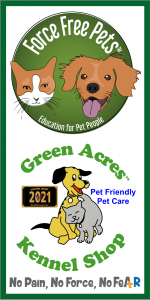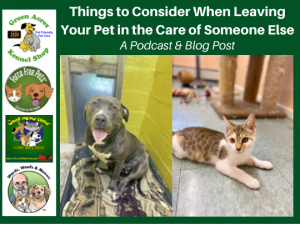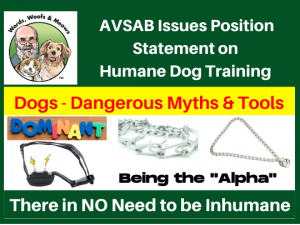 < A version of this article was published in the OCT 2021 issue of Downeast Dog News>
< A version of this article was published in the OCT 2021 issue of Downeast Dog News>
< Updated 10OCT21 >
< A short link for this page – https://bit.ly/AVSABHumaneDogTraining >
In August, the American Veterinary Society of Animal Behavior (AVSAB) issued a position statement on humane dog training. I encourage all veterinarians, dog trainers and behavior consultants, other pet care professionals, animal shelters and rescues, breeders, and pet parents to familiarize themselves with the position statement and the cited studies. This is information they MUST be familiar with to practice ethically. The position statement refutes many myths about dogs, their behavior, and training, such as dominance, pack hierarchy, and the need to be “alpha.” AVSAB concludes its statement with the following:
familiarize themselves with the position statement and the cited studies. This is information they MUST be familiar with to practice ethically. The position statement refutes many myths about dogs, their behavior, and training, such as dominance, pack hierarchy, and the need to be “alpha.” AVSAB concludes its statement with the following:
“Based on current scientific evidence, AVSAB recommends that only reward-based training methods are used for all dog training, including the 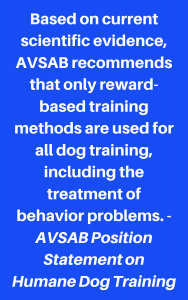 treatment of behavior problems. Aversive training methods have a damaging effect on both animal welfare and the human-animal bond. There is no evidence that aversive methods are more effective than reward-based methods in any context. AVSAB therefore advises that aversive methods should not be used in animal training or for the treatment of behavior disorders.” [emphasis added]
treatment of behavior problems. Aversive training methods have a damaging effect on both animal welfare and the human-animal bond. There is no evidence that aversive methods are more effective than reward-based methods in any context. AVSAB therefore advises that aversive methods should not be used in animal training or for the treatment of behavior disorders.” [emphasis added]
AVSAB joins the Pet Professional Guild (PPG) and the American Animal Hospital Association (AAHA), which have similar position statements. FMI – https://bit.ly/Pos_HumaneTraining
One of the critical reasons for this position is that aversive methods and tools negatively affect animal welfare. They cause distress which is inhumane.
“In observational studies, dogs trained with aversive methods or tools showed stress-related behaviors during training, including tense body, lower body posture, lip licking, tail lowering, lifting front leg, panting, yawning, and yelping.” 4–8
In contrast, “Dogs trained with reward-based methods showed increased attentiveness to their owner.” 5
As a pet parent, minimal or no stress and increased attentiveness are precisely what I want in my dog. As a professional dog trainer, I know it is what my clients desire as well. Having a relationship with your dog based on mutual trust is essential to successful training. Anyone who has been intentionally subjected to force, pain, or fear by someone knows those things will NEVER build trust.
Unfortunately, there are also long-term effects related to the use of aversives.
“Survey studies have shown an association between the use of aversive training methods and long-term behavior problems including aggressive behavior towards people and other dogs, and anxiety-related behaviors such as avoidance and excitability.” 8–15 Additionally, “Several studies show the effect of aversive training persists beyond the time of training. After dogs learned a cue taught using aversive training methods, they continued to show stress-related behaviors when the cue was presented, suggesting the cue itself had become aversive.” 5,7,8
In other words, the use of aversives can create a lifetime of chronic stress for a dog. Most of us consider our dog our companion, and many refer to their dog as their best friend. But, who wants a life of chronic stress and fear for their best friend? No one, I hope.
Dogs with behavior issues such as reactivity, aggression, anxiety, and hyperactivity are challenging to live with and often have chronic stress in their lives, often creating distress for their person. Since these undesirable behaviors result from an emotional response, they cannot be “trained” away without first building trust. As noted above, aversives NEVER build trust. FMI – http://bit.ly/Canine-Stress
As a trainer, one of the first things I teach my clients is how to manage their dog and the environment to avert behaviors like aggression and anxiety. These behaviors are much easier to prevent than they are to fix after they develop. Incidentally, studies by Blackwell and Hiby10, 14 demonstrated that dogs trained using rewards are less likely to develop behavior problems than dogs trained with aversives.
Proponents of inhumane training techniques often argue that force is the only way to get results. However, that position is not supported by science. On the other hand, ample evidence in the peer-reviewed literature demonstrates that reward-based training works very well.
“Reward-based training methods have been shown to be more effective than aversive methods” .1,2,17
“Multiple survey studies have shown higher obedience in dogs trained with reward based methods.”9,14,18
A study by Hiby et al. (2004) “…found that obedience levels were highest for dogs trained exclusively with reward-based methods and lowest for dogs trained exclusively with aversive-based methods.” 14
The evidence from multiple studies is clear; if you want a well-trained dog, the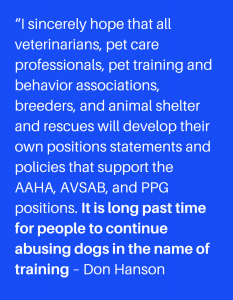 best way to achieve that goal is with rewards, not punishment. I genuinely believe that no one with a dog wants to hurt their dog. If you or your trainer cannot get results without punishment, step back and recognize it’s time for you to learn a better way. Many trainers can help you get the results you want without resorting to aversives.
best way to achieve that goal is with rewards, not punishment. I genuinely believe that no one with a dog wants to hurt their dog. If you or your trainer cannot get results without punishment, step back and recognize it’s time for you to learn a better way. Many trainers can help you get the results you want without resorting to aversives.
When looking for a trainer, AVSAB recommends:
“An appropriate trainer should avoid any use of training tools that involve pain (choke chains, prong collars, or electronic shock collars), intimidation (squirt bottles, shaker noise cans, compressed air cans, shouting, staring, or forceful manipulation such as “alpha rolls” or “dominance downs”), physical correction techniques (leash jerking, physical force), or flooding (“exposure”). The learner must always feel safe and have the ability to “opt out” of training sessions. All efforts should be made to communicate effectively and respectfully with the learner.”
I sincerely hope that all veterinarians, pet care professionals, pet training and behavior associations, breeders, and animal shelter and rescues will develop their own positions statements and policies that support the AAHA, AVSAB, and PPG positions. It is long past time for people to continue abusing dogs in the name of training.
Recommended Resources
References
AVSAB Humane Dog Training Position Statement – https://avsab.org/wp-content/uploads/2021/08/AVSAB-Humane-Dog-Training-Position-Statement-2021.pdf
2015 AAHA Canine and Feline Behavior Management Guidelines – https://www.aaha.org/globalassets/02-guidelines/behavior-management/2015_aaha_canine_and_feline_behavior_management_guidelines_final.pdf
PPG Guiding Principles – https://www.petprofessionalguild.com/Guiding-Principles
How to Select A Dog Trainer – http://bit.ly/HowToSelectADogTrainer
Important Position Statements Related to Animal Welfare & Care in the USA by Leading Organizations – https://bit.ly/Pos_HumaneTraining
Understanding, Identifying and Coping with Canine Stress – http://bit.ly/Canine-Stress
What’s Shocking about Shock? – What Science Tells Us About the Use of Shock in Dog Training – PPG BARKS from the Guild – July 2019 – http://bit.ly/ShockBARK-JUL2019
The Unintended Consequences of Shock Collars – http://bit.ly/ShockCollars
Things I Wish I Had Known Before I Started Training Dogs – Gus, the Dominance Myth, An Alpha Roll, and a Damaged Relationship – WWM-SEP2018 – http://bit.ly/Things-Gus-Dominance
Things I Wish I Had Known Before I Selected My First Dog – Aversives are Unnecessary and Counter-Productive When Training A Dog – Part 1 – WWM-JAN2019 – http://bit.ly/Things-Aversives-1
Things I Wish I Had Known Before I Selected My First Dog – Aversives are Unnecessary and Counter-Productive When Training A Dog – Part 2 – WWM-FEB2019 – http://bit.ly/Things-Aversives-2
Choke Collar Pathology – an excellent blog post from dog trainer Daniel Antolec on the dangers of using a choke collar on a dog. – http://ppgworldservices.com/2017/06/13/choke-collar-pathology/

The Unintended Consequences of Shock Collars – http://bit.ly/ShockPodcast
The Pet Professional Guild and the Shock-Free Coalition with Niki Tudge – http://bit.ly/PodCastShockFree-NikiTudge-2017
What’s Shocking About Shock – What Science Tells Us About the Use of Shock in Dog Training – http://bit.ly/WfMw-WhatShock-27JUL19
Podcast – Charlee and the Electronic Shock Containment System w-Dan Antolec – https://bit.ly/Blog-Charlee_E-Fence
________________________________________________________________________
Don Hanson is the co-owner of the Green Acres Kennel Shop ( greenacreskennel.com ) in Bangor, Maine, where he has been helping people with their pets since 1995. He is also the founder of ForceFreePets.com, an online educational resource for people with dogs and cats. Don is a Bach Foundation Registered Animal Practitioner (BFRAP), Certified Dog Behavior Consultant (CDBC), Associate Certified Cat Behavior Consultant (ACCBC), and a Certified Professional Dog Trainer (CPDT-KA). He is a member of the Pet Professional Guild (PPG), where he serves on the Board of Directors and Steering Committee and chairs the Advocacy Committee and The Shock-Free Coalition ( shockfree.org ). Don produces and co-hosts a weekly radio show and podcast, The Woof Meow Show, that airs on Z62 Retro Radio WZON (AM620) and WKIT 103.3-HD3 and is streamed at http://bit.ly/AM620-WZON every Saturday at 9 AM. Podcasts of the show are available at http://bit.ly/WfMwPodcasts/, the Apple Podcast app, and Don’s blog: www.words-woofs-meows.com. The opinions in this post are those of Don Hanson.
©10OCT21, Donald J. Hanson, All Rights Reserved
< Click for Copyright and Use Policy >
 < Click to Listen to Podcast >
< Click to Listen to Podcast > Eastern Area Agency on Aging
Eastern Area Agency on Aging